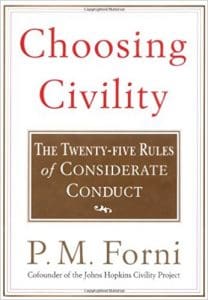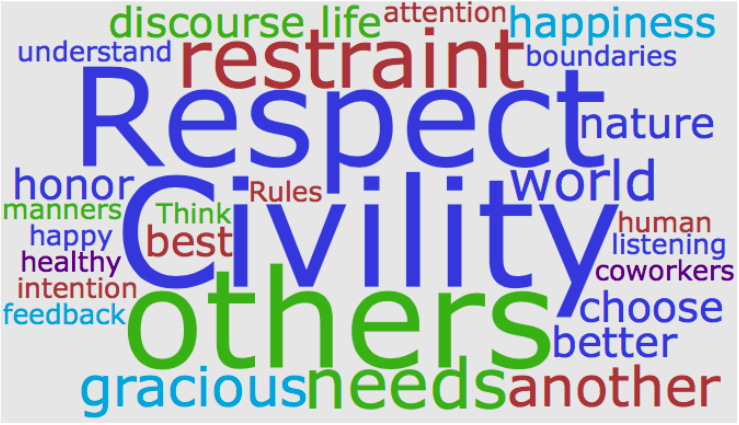I sense so much tension in the world, today. I know that there have been times in human history when conflict was uglier and more violent, and that, statistically speaking, the world has never been safer; and yet…
The ugliness that exists today feels so pervasively personal. Internet trolls have affected our ability to have civil 
Where are the Leaders? What has happened to Respect?
I revisited a book that inspired me in 2002 and which always reminds me of our (collective) capacity to elevate others and ourselves every day through the way we behave:
Choosing Civility: The 25 Rules of Considerate Conduct by P.M.Forni.
What is Civility?
The author writes: “as we grapple with the complexities of our age, I suggest in this book that we agree on one principal: that a crucial measure of our success in life is the way we treat one another every day of our lives. When we lessen the burden of living for those around us we are doing well; when we add to the misery of the world we are not.”
“Being civil means being constantly aware of others and weaving restraint, respect, and consideration into the very fabric of this awareness. Civility is a form of goodness; it is gracious goodness… It also entails an active interest in the well-being of our communities and even a concern for the health of the planet on which we live.” He lists a full page of examples, ending with, “…these diverse behaviors are all imbued with the spirit of civility.”
On page 15 Forni reminds us: “…our happiness doesn’t spring from the events of our lives but rather from how we choose to respond to those events. If we have control over what we think about what happens to us, we have control over how we feel about it as well. This means, in turn, that we can be the makers of our own happiness.” [Can you see why I love this guy?!]
‘While happiness involves choosing how we interpret the world around us, restraint is a behavior that is required for civility. Restraint is an infusion of thinking—and thoughtfulness—into everything we do. We choose the behavior that, although it may not seem the most gratifying now, will make us feel good five minutes from now, tomorrow, or next year. Restraint is the art of feeling good later.”
“To be civil—to behave, that is, in a manner that takes into consideration the feelings and the comfort of others—means practicing the art of giving. <…> By treating you the best way I know how, I appeal to the best in you, urging you to do the same.”
Rules of civility have been around for a very long time. They appear in the text of all religions from Judaism and Christianity to Confucianism, from Islam to Hinduism. They are found in Renaissance writings, Victorian-era manners books, and in the works of philosophers from Plato to Kant.
Following these rules may not feel like a shortcut to a good life. Civility requires work and dedication. But so does Happiness. If you want to strengthen any muscle (intellectual, physical, or emotional) you must stretch and work it regularly.
Forni believes that one major consequence of civil behavior is to “lower the amounts of stress in everyday life, especially in the workplace.” Hmm – we can all use a good dose of that, eh?!
What follows are the 25 Rules followed by my tiny summary. As you scan, notice what resonates for you.
The 25 Rules of Civility
- Pay attention. Attention is a tension connecting us to the world around us; only after we notice the world can we begin to care for it. Open your eyes and observe the world around you. Take in the fullness of that amazing person sitting across from you in conversation. When you shift from superficial and transactional to truly “seeing” the world around you, it feels more natural to engage in behavior that will deepen your relationships.
- Acknowledge Others. Avoid treating anyone—from coworkers to anonymous retail clerks—as invisible. When you make eye contact, offer a simple “good morning,” or use someone’s name at the beginning of an email, you acknowledge their existence and legitimacy.
- Think the Best. Assume positive intent: most people are doing the best they can with the resources and the wit available to them.
- What stops us from good listening is that we focus on ourselves and our own needs instead of focusing on other people. Remember that most people don’t need you to solve their problems; they just want to feel heard and safe.
- Be Inclusive. When you create boundaries, draw them around ideas, not people. Strive to push past your discomfort with the unfamiliar to be curious, instead.
- Speak Kindly. Learn how to be direct without offending, both in word and tone. You can deliver even critical feedback in a kind, caring way.
- Don’t Speak Ill. When you gossip or speak unkindly of people when they are not present, you say far more about yourself than you do about those others.
- Accept and Give Praise. Compliments and appreciation cost you nothing, yet have great value when given to another. In like manner, when someone else gives you that Gift, accept it graciously.
- Respect Even a Subtle “No.” Honor other people’s boundaries. It’s not always about You.
- Respect Others’ Opinions. Respecting what others think does not mean we are being untrue to ourselves; it simply honors their right to look at the world differently than we do. This rule is a prerequisite to civil discourse and healthy debate.
- Mind Your Body. Good grooming helps us to feel better about ourselves and shows respect for others with whom we interact.
- Be Agreeable. If you are always the stubborn cuss who won’t go along with anyone else’s plans or ideas, you are being uncivil. You need not always say Yes, but look for opportunities where you can at least compromise in service of the group or a relationship.
- Keep It Down (and Rediscover Silence). Even in today’s always on world, there are places (houses of worship, libraries, theaters, public transportation) where loud talking and digital noise are inappropriate.
- Respect Other People’s Time. Wait your turn to speak. Manage your calendar so as to be punctual and available for commitments you have made. Begin and end on time.
- Respect Other People’s Space. Whether with coworkers in their cubicles or with partner/kids in your home, understand the prevailing culture and honor the norms that exist around entering or using other peoples’ space and things.
- Apologize Earnestly and Thoughtfully. Badly handled, high profile apologies make headlines. When you apologize, make clear that you know what you did was wrong, that you understand the effects of your actions, and that you are not looking for excuses.
- Assert Yourself. A healthy attention to your own needs is required for you to be happy in the world. Assertiveness is that space where are you honor your own Yeses and No’s without violating the needs or rights of others.
- Avoid Personal Questions. Civil conversations generally do not inquire into religion, politics, money, personal relationships, health, or physical appearance.
- Care for Your Guests. Be gracious in your hospitality yet clear about responsibility. If you expect a dinner guest to bring a dish, offer guidance; if a houseguest is expected to do their own laundry, make sure they are familiar with the washing machine!
- Be a Considerate Guest. Clean up after yourself, show respect for other people’s stuff, and don’t overstay your welcome.
- Think Twice Before Asking for Favors. Consider the impact on others before you ask. Strive to keep the system in balance—say Yes to as many favors as you request of others.
- Refrain from Idle Complaints. If you are more interested in finding Blame then in finding a Solution, then you are whining. Don’t do that.
- Give Constructive Criticism. If your intention is to help with the problem, please share. If your intention is to humiliate, manipulate, or exact revenge, better to hold your tongue.
- Respect the Environment and Be Gentle to Animals. A Native American saying goes, “We do not inherit the earth from our ancestors, we borrow it from our children.” For thousands of years, humanity’s relationship with nature was fear: nature is dangerous, so we must defend ourselves from it. Over recent decades, that attitude has been replaced by, “Nature is in danger, so we must defend it from ourselves.”
- Don’t Shift Responsibility and Blame. If you did it or caused it, own it.
The Happiness Connection
Notice that none of these rules require that you be a conformist or in anyway subjugate your own needs. You can live your life fully, authentically, and creatively, AND do it in a way that elevates you and everyone around you.
Put another way, your Happiness never needs to be at the expense of someone else’s.
If you serve in the role of a Leader, seek balance. You can exercise power AND be civil. You can command AND respect others.
Remember, Leadership is not about a title; anyone can be a leader who shows consideration for others and the greater, long-term good.
Keep that in mind as you Lead or when you assess the skills of those who lay claim to the mantle of Leadership.
Do This For Yourself:
The 13 Principles of Happiness offer a framework for a less-stress life. Print a copy here, and post it on your workstation or fridge as a reminder to live your life deeply and from a happy space.

